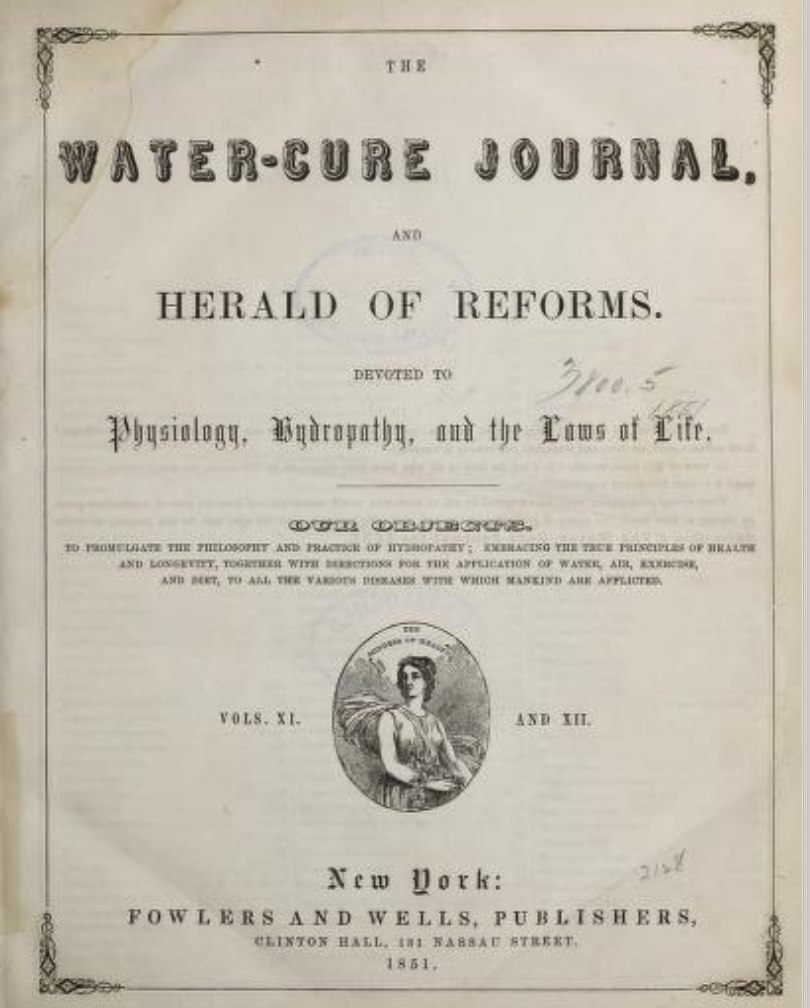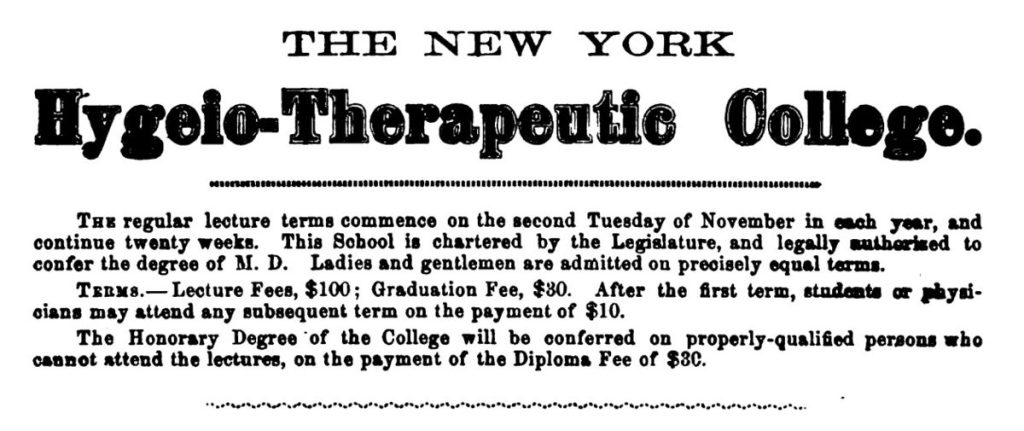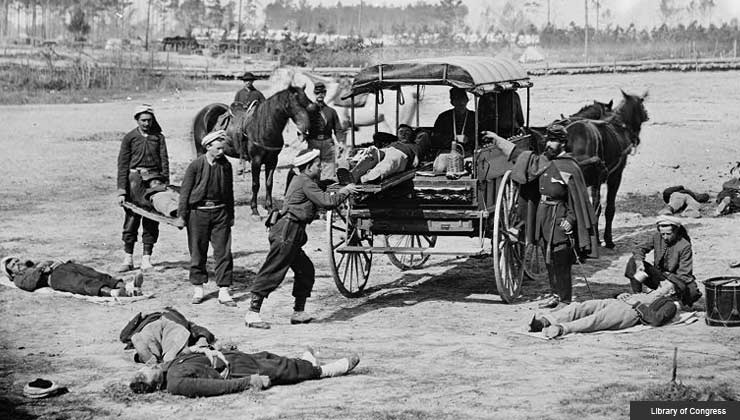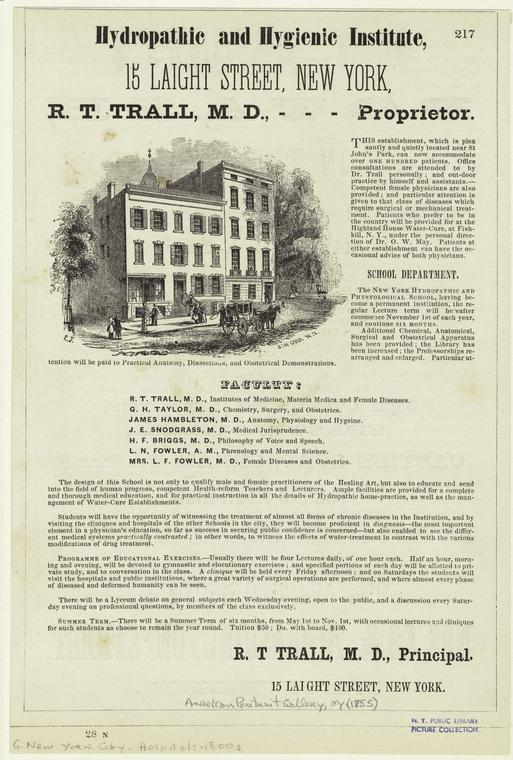(1812-1877)
He was an American physician and proponent of hydrotherapy and natural hygiene. In 1874, he authored the first vegan cookbook called The Hygeian Home Cookbook. Although the term “vegan” was not coined until 1944, Dr. Trall’s influential book featured vegetarian recipes that did not include milk, eggs, sugar, salt, yeast, acids, alkalies, grease, or condiments of any kind. He believed in providing “pure and palatable food” to all individuals and advocated “eating to live.” Dr. Trall was a vocal opponent of alcohol, coffee, meat, and tea consumption, and he expressed concerns about the potential health risks associated with spices. He successfully treated many patients without using drugs and authored over 40 books, garnering a loyal following in the 19th century. His contributions made him a foundational figure of the National Health Association.
Quote
Excerpt From Graham, S., Trall. R., Shelton, H. (2009) The Greatest Health Discovery. Youngstown, OH. National Health Association.
“The system which we endorse and practice is true—in harmony with nature, following the laws of the vital organism, correct in science, sound in philosophy, in agreement with common sense, successful in results, and a blessing to mankind.”

(The Hygeian Home Cook-Book).
Russell Thacker Trall was born in Vernon, Connecticut, on August 5, 1812. He was the 7th child of Russell and Tirzah Thatcher Trall. His parents moved to Western New York, which was little more than a wilderness during his infancy. Throughout his youth, he worked on his father’s farm. As he grew into a young man, he began to have issues with his health. This poor health helped him laser-focused his interest in medicine. He was a keen observationist and believed that the doctors who treated him, using methods of the day, caused him more harm than any good. He wasn’t satisfied with their explanations of his illness or the remedies they wanted to use.
He decided to investigate his health issues, wishing to get to the root cause, and thus began his journey to learn about health. Since there were few educational opportunities, he started training as a medical student with a local village physician. He studied the leading schools of therapy, i.e., “regular” (allopathic) medicine, homeopathy, and the eclectic, physico-medical, and chrono-thermal traditions.
During his studies, he began to think that most current medical doctrines were harmful and downright dangerous. He became very skeptical of the so-called medical science of the world.
In 1840, he began a “regular” (allopathic) practice. Discontent with the results of most therapies, he based his practice in increasing measure on the ideas of Vincent PrieBniz (hydrotherapy) and Sylvester Graham (health through healthful living).
The Water Cure Institution in New York was founded by Dr. Trall in 1844 and was the first to begin in the United States. His institute was a cross between an urban health farm and a boarding house, offering plain vegetarian meals, hydrotherapy treatments, a gymnasium, public rooms, and, starting in the 1860s, a health food shop selling whole grains, cereals, Graham bread (Trall was a friend of Sylvester Graham), and his books on food reform, hygiene, sex, and physiology. He was genuinely forward-thinking when setting up this institution. He realized that if the next generation were to change, he would have to educate them.

In 1849, Trall, along with Joel Shew and Samuel R. Wells, founded the American Hydropathic Society. Additionally, Trall and Wells established the American Anti-Tobacco Society in the same year.
In 1850, Trall organized a convention for the American Hydropathic Society in New York City, and during that year, the Society evolved into the American Hygienic and Hydropathic Association of Physicians and Surgeons.
Dr. Russell Thacker Trall, Sylvester Graham, Dr. William Alcott, and William Metcalfe, the pastor of the Bible-Christian Church, founded the American Vegetarian Society (AVS) in Philadelphia. The society held its first official meeting at the Bible-Christian Church in Philadelphia on September 4, 1850, after a founding convention in New York City. However, during the Civil War, the group’s membership and influence declined as the nation’s focus shifted towards the war.
Dr. Trall established the New York Hydropathic and Physiological School, which later became known as the New York Hygeio-Therapeutic College in 1857. He then moved operations to New Jersey in 1867 with his Hygeian Home. The New York Hydropathic and Physiological School is chiefly notable today as one of the first medical schools in the United States to admit women candidates for the Doctor of Medicine degree. In the first class, the school graduated 50 physicians, about half of which were women.
In 1863, Trall became the editor of “The Water-Cure” journal, which was later renamed “The Herald of Health”. Trall passionately advocated for “hygeiotherapy,” a comprehensive approach that combined hydrotherapy, diet, and exercise, emphasizing fresh air, hygiene, and massage. Although this concept faded after he died in 1877, Sebastian Kneipp revived this approach in the 1890s.

In 1868, James Springer White, Co-Founder of the Seventh-day Adventist, invited Trall to teach a series of health lectures in Battle Creek, MI, during the annual general conference meetings. Trall was then asked to contribute regularly to their publication, The Health Reformer magazine. However, the magazine faced challenges as many readers disagreed with Trall’s strict dietary guidelines, which included avoiding butter, eggs, milk, oil, salt, and sugar. These views were seen as radical, leading to declining subscription rates. In 1871, James White took over as the editor of The Health Reformer and pledged to move away from the extreme dietary ideas. Despite this, Trall continued to write for the magazine.
Trall’s earlier cookbooks promoted vegetarianism. However, “The Hygeian Home Cook-Book,” published in 1874, was the first vegan cookbook in America. This influential book features recipes that do not include milk, eggs, sugar, salt, yeast, acids, alkalies, grease, or condiments of any kind. Trall was a staunch advocate against the consumption of alcohol, coffee, meat, and tea and voiced concerns about the potential health risks associated with spices. Later in Dr. Trall’s life, the trend was to move away from hydropathy, and the emphasis was then placed on Hygiene and health.
Dr. Trall did not believe in administering any drugs, medicines, or alcoholic stimulations of any kind. He believed that the medical profession did more harm than good with drugs and doses. He thought that they would never find a healing solution using drugs, for none exists. In contrast, his hygienic principles reject drugs because they do not heal the body, and he prefers to employ hygienic lifestyle practices because they help the body to heal.
Dr. Russell Thacker Trall died in Florence, New Jersey, on September 23rd, 1877, at the age of 65.
Quote
“The argument has been offered that Dr. Trall was a hydropath and that his Encyclopedia proves it. The argument is quite true if we focus only on 1851. But as he lived some 26 years longer and his philosophy and practice underwent considerable evolution during that period, it is as inaccurate to judge him by Encyclopedia as it would be to judge him by his degree, Doctor of Medicine. Such an argument would cause one to say that Martin Luther was a catholic priest, for he certainly was before he became the leader of the German reformation movement. Just as Luther became a protestant, so Trall became a Hygienist.”
From: Natural Hygiene: The Pristine Way of Life
Life in the 1800s

Alexander Gardner/Library of Congress
Russell grew up in a time when the US was still unshackling itself from England. Though freed of British influence at this time, America was far from being a nation of men who were unfettered. Man’s living habits were so contrary to natural laws that he was held in bondage by his faulty behavior. Dr. Trall was not only a medical revolutionist; he was also a health and medical reformer dedicated to the emancipation of man through knowledge of physiological and hygienic principles.
One of the most significant events of the 1800s was the Civil War. Many soldiers died from illness and infected wounds. During this time, water was often contaminated, medical equipment was not sterilized, and doctors rarely washed their hands. Dysentery was the worst in the military camps, entering the body through contaminated food or water and attacking the intestines. Hygiene was deplorable, and latrines were often located near drinking water sources. Typhoid was another unsanitary disease that could quickly spread from an infected person. Pneumonia was also responsible for many deaths, as men were unable to breathe as their lungs filled with fluids. Malaria was another factor, but it wasn’t as fatal if treated with quinine. Even measles killed an estimated one in twenty of those who came down with the disease.
Teachings
Quote
“There are but two medical systems: the Drug Medical System and the Hygienic Medical System. One employs poisons as the proper disease remedy; the other employs hygienic materials and agencies.”
—R.T. Trall M.D.

Dr. Trall firmly believed that the proper system of the Healing Art—Hygienic Medication rejects drugs, medicines, or poisons. It rejects them because they are intrinsically bad and employs hygienic agencies (air, light, temperature, water, etc.) because they are inherently good.
Trall began the Water Cure Institution in New York in 1844, the first in the United States. He was genuinely forward-thinking in setting up this institution. He realized that if the next generation were to change, he would have to educate them.
From this time, Dr. Trall did not administer any drugs, medicines, or alcoholic stimulations of any kind. He believed that the medical profession harms many with drugs and doses. He thought that they would never find a healing solution using drugs, for none exists. In contrast, his hygienic principles reject drugs because they do not heal the body, and he prefers to employ hygienic lifestyle practices because they help the body to heal.
Drug medication, no matter what disguise, he believed, produced disease in healthy people.
On the contrary, hygienic medication rejects all poisons. Its foundation is the same materials and influences that preserve health and wellness (i.e., clean air, light, temperature, good food, water, etc.).
Trall’s diet was simple, consisting chiefly of Graham’s bread, hard Graham crackers, fruits, and nuts — two meals a day, without salt. He neither drank tea, coffee, or milk but consumed only soft water. He had a solid work ethic and lived on very little sleep.
In 1851, he wrote The Hydropathic Encyclopedia: A System of Hydropathy and Hygiene; In Eight Parts, published by the Army Medical Library. This encyclopedia is an elaborate work of nearly one thousand pages, which not only discusses the theory and practice of Hydropathy but also considers the philosophy and treatment of diseases practiced by the older schools of medicine. This book delves extensively into the anatomy and physiology of the human body, hygiene, preservation of health, dietetic and hydropathic cooking, water treatment, unique pathology, symptoms and treatment of known diseases, surgery, midwifery, and the nursery. It is a fantastic achievement, given the writing tool of the day was the quill. The circulation of the encyclopedia alone exceeded over forty thousand copies!
His book, the Hydropathic Encyclopedia, was geared towards the medical profession. He quickly realized that he needed a book for the layman. In 1855, he published Hydropathy for the People: with Plain Observations on Drugs, Diet, Water, Air and Exercise. His objective was to indoctrinate everyone on the general principles of Hydropathy.

with Recipes for Cooking on Hygienic Principles: Containing also a Philosophical Exposition of the Relations of Food to Health.
The Hydropathic Cookbook was a natural outcome of his dietetic system. It includes a compilation of recipes and a scientific treatise on food. Popular Physiology was a brief but thorough treatise on human physiology and was used as a textbook.
The catalog of his published books includes more than forty volumes, embracing the subjects of physiology, diphtheria, hydropathy, hygiene, vegetarianism, temperance, women’s health, and books to teach women how to create a hygienic home, prepare food, as well as taking care of the sick.
You will find links to his original books in the publication section and a summary. These works have been digitally preserved, which provide a proud legacy and tribute to Dr. Russell Thacker Trall—a true pioneer and trailblazer of the National Health Association.
Dr. Trall, through illness, learned of hygiene and spent a lifetime advocating the basic tenets of physiology as applied to everyday living. It could be said of him that he was the greatest educator, through his extensive teachings of the gospel of Health, the world has ever known.
Notable Achievements

found on the inside cover of one of his numerous publications.
In 1853, Trall founded the New York Hydropathic and Physiological School, which became the New York Hygeio-Therapeutic College in 1857. His students learned water treatment and nutrition, the virtues of self-discipline, and emotional, sexual, and physical moderation. Men and women were admitted on equal terms, which was then foreign in society.
Trall noted that soldiers in the Civil War were dying from typhoid fever, pneumonia, measles, dysentery, etc., and quite unnecessarily. He knew that the application of hygienic medication would save many lives.

removing wounded soldiers from the field during the Civil War.
The successful treatment of soldiers in the Civil War was of national importance to Trall. He wanted to present the merits of Hydropathy and Hygiene versus allopathic therapy to the nation. His goal was to extend and share his knowledge throughout the civilized world.
Trall believed that there are but two medical systems in existence–the Drug Medical System and the Hygienic Medical System. He wanted to expose the fallacies of drug medication and explain the truths of the hygienic system. He addressed letters to President Lincoln, the secretaries of State, War, the Navy, the Treasury, and Members of Congress in Washington. He never received a response.
Dr. Trall Goes to Washington
However, he was determined to be heard in Washington and would only leave once he had done so. He was persistent.
His objective was to expose the fallacies of drug medication and explain the truths of the hygienic system in a place and circumstance that would command attention. He faced many obstacles, but his tenacity prevailed, and he lectured at the Smithsonian Institute in 1862.
For over ten years, Trall openly challenged the leading medical men of his day to dispute the veracity of Natural Hygiene practices. Additionally, Trall wanted to disprove the validity of their system. His culminating efforts occurred when he delivered his address at the Smithsonian Institute in Washington, D. C., which brought out the stark treatment of medical doctors.

The challenge offered a debate on the difference between the standard medical practice and Trall’s hygienic principles. Any professor in an allopathic medical college or the civilized world was allowed to refute or disprove, in any way, hygienic principles. That challenge was never accepted.
Dr. Trall explains in his Water Cure Journal, “I inquired how long a Washington audience could be kept patiently in their seats and was informed that about one hour was the usual length of lectures and that the longest lecture thus far had been one hour and a half. The reader may judge my interest in my subject when I state that the audience listened intently for two hours and a half—from eight to half-past ten.”
Quote:
–R. T. Trall, 1862
“I conclude with a single remark. All history attests to the fact that wherever the Drug Medical System prevails, desolation marks its track, human health declines, vital stamina diminishes, diseases become more numerous, more complicated, and more fatal, and the human race deteriorates. On the contrary, wherever the Hygienic Healing System is adopted–and there is no exception–renovation denotes its progress, and humanity improves in all the relations of its existence. These are why I value the opportunity to speak for the welfare of the great human family.”
While Trall gave a powerful lecture at the Smithsonian, his ideas were lost between the war and the country’s recovery post-civil war. Later, he published these concepts in The True Healing Art: Or, Hygienic vs. Drug Medication in 1872.
One of Dr. Trall’s later works is Digestion and Dyspepsia, which had a wide circulation.
In the first part, digestion, he discusses nutrition, intestinal digestion, absorption of nutrients, aeration of the food elements, and tobacco. For the ladies, he discussed tight-laced corsets and their impact on digestion! They were indeed tight.
In part II, he goes into dyspepsia, which is indigestion. Dyspepsia originates from Latin and Greek and means ‘difficult to digest.’ He discusses the nature of dyspepsia, its causes, symptoms, and treatment principles related to food, drink, exercise, bathing, clothing, sleep, ventilation, light, temperature, mental influences, and occupation.

The Mother’s Hygienic Handbook was a manual for women to learn home hygienic principles, including the care and management of children. It was considered an exceedingly valuable work, as there were few resources for women then.
Why hasn’t this information been passed down and updated as we learned more about the human body?
In 1873, as a follow-up for mothers, he wrote The Hygienic Handbook, a practical guide for dealing with the sick. It was arranged alphabetically and was regarded as an illustrative appendix of hygeio-therapeutic practices.
Other works by Dr. Trall worthy of mention are Alcoholic Controversy, True Healing Art, Uterine Diseases, Tobacco Usage, Water Cure for the Millions, and The Temperance Platform.
Dr. Russell Thacker Trall was an amazingly prolific writer on all things human and was a true pioneer of the National Health Association. His vast work influenced, educated, and healed thousands. Considering this was done well over 150 years ago, his insights were extraordinary.
To clearly define this man and his thinking would require hundreds of pages. The constructive influence that he exerted would require as many more. Dr. Trall was a man of impeccable honesty. He was uncompromising in his dedication to truth. Moral principles animated his work and controlled every move he made in Health reform. His credo was not merely verbal mutterings; any threat that might compromise his hygienic principles, he did not hesitate to counteract.

Today, we can profit greatly from the pioneers in hygiene, such as Russell Thacker Trall, who drove to preserve the purity of hygienic principles.
Learn more from: (Read Direct Excerpts)
- Graham, S., Trall. R., Shelton, H. (2009). The Greatest Health Discovery. Youngstown, OH. National Health Association.
- Graham, S. (1833). A Lecture on Epidemic Diseases Generally, and Particularly the Spasmodic Cholera. New York, Mahlon Day.
- Shelton, H. (1968). Natural Hygiene: The Pristine Way of Life Youngstown, OH. National Health Association.
Quote
—R.T. Trall M.D.
”The Drug Medical System cannot bear examination. To explain it would be to destroy it, and to defend it, even is to damage it.”
The NHA wishes to remind the readers that nothing in this or other publications is intended to constitute medical treatment or advice. Readers should be aware that some previous publications do not reflect the NHA’s current health teachings or approach to health in several areas.
Our Mission
The mission of the National Health Association is to educate and empower individuals to understand that health results from healthy living. We recognize the integration of all aspects of health: personal, environmental, and social.
We communicate the benefits of a plant-based diet, exercise and rest, a healthy environment, psychological well-being, and when indicated, the use of fasting.


 SUBSCRIBE TODAY AND NEVER MISS AN UPDATE
SUBSCRIBE TODAY AND NEVER MISS AN UPDATE